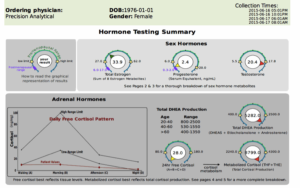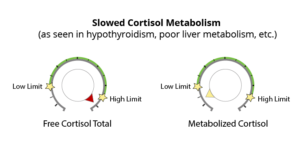 It is difficult to imagine anyone who is not stressed in the midst of the Covid19 pandemic. Stress can have a profound effect on our emotional and physical well-being, affecting everyone at some point and causing symptoms. These include weight gain, depression, digestive problems and many more. Continued imbalance of stress hormones can wear the body down, triggering chronic fatigue.
It is difficult to imagine anyone who is not stressed in the midst of the Covid19 pandemic. Stress can have a profound effect on our emotional and physical well-being, affecting everyone at some point and causing symptoms. These include weight gain, depression, digestive problems and many more. Continued imbalance of stress hormones can wear the body down, triggering chronic fatigue.
This is the second post in our DUTCH testing series. If you missed the first one about oestrogen metabolism you can read it here. Oestrogen metabolism is assessed in the hormonal component of the DUTCH test and cortisol (our stress hormone) and its metabolites are assessed in the adrenal component of the test.
Stress hormones
DUTCH is a reliable marker of the stress response and is a critical tool for revealing adrenal imbalances (or hypothalamus-pituitary-adrenal (HPA) axis dysfunction) that may be subtly or dramatically influencing your health. The test accurately reflects the levels of hormones by detecting the active component of those functions at a cellular level.
The adrenals are responsible for the secretion of the body’s major stress hormones, cortisol and DHEA. These hormones are not released constantly throughout the day. They are secreted in a cycle called the circadian rhythm, the highest values are in the morning and the lowest at night.
Why is circadian rhythm important?
Circadian rhythms are physical, mental, and behavioural changes that follow a daily cycle. They are cycles that tell us when to sleep, wake and eat. When it’s dark at night, your eyes send a signal to the hypothalamus that it’s time to feel tired. Your brain, in turn, sends a signal to your body to release melatonin (also measured on the DUTCH test) which is our sleep hormone. That’s why your circadian rhythm tends to coincide with the cycle of daytime and night-time, and this is how it works best.
What Causes Stress?
Factors that may contribute to stress include negative dietary and lifestyle habits (including over-consumption of stimulants such as sugar and caffeine), excessive exercise, injury, bereavement, marriage, divorce, debt, attitudes such as perfectionism, obsessive-compulsive behaviours, shyness, insecurity and also perhaps isolation and loneliness. An increase in cortisol may also be driven by non- emotional or physical sources such as infection, toxins, gut imbalances and various other sources of inflammation.
Perception is key
The way your body responds to chronic stress disrupts the HPA axis referred to earlier. It is important to note the relevance of perception of stress here – a situation that one person may find incredibly stressful, another person may not. Similarly, there may be different total and free cortisol patterns from person to person and differences in cortisol metabolism. This is why testing is so important to determine the correct support for you.
The importance of balanced stress hormones
- Maintain emotional and physical energy
- Strengthen the immune system against colds, coughs, flu and possibly more serious illness
- Improve metabolism, help reduce fat storage and control appetite
- Slow down the aging process, decrease PMS and menstrual difficulties
- Aid dietary and protein synthesis – helping moods
- Prevent osteoporosis
- Maintain healthy blood pressure levels and lower LDL (‘bad’) cholesterol levels
Who should take this test?
Anyone with any of the following symptoms should take this test:
- PMS, cravings, weight gain or loss, abdominal obesity, inexplicable hunger
- Increased number of minor infections and viruses (e.g. thrush, cystitis, colds, flu)
- Poor concentration and memory, insomnia, depression, loss of libido
- Headaches, moods swings, anxiety, panic attacks, nervousness and/or irritability
- Chronic fatigue, low energy
If you would like to talk to us about testing, or how we can support your nutrition, call us on 01 2655977 or book online now.



